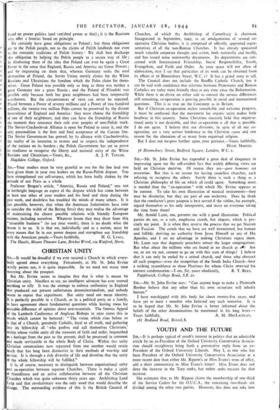CHRISTIAN UNITY
Sot,—It would -b dreadful if. we ever secured a Church in which every- body agreed about everything. -Fortunately, as Mr. St. John- Ervine wittily- points out,- it is quite impossible. So we need not waste time worrying about the prospect.
But Mr. Ervine seems to imagine that that is what is meant by Christian unity. Needless to say, no intelligent advocate has ever wanted anything so silly It was the attempt to enforce uniformity in England that- produced our present unfortunate denominationalism, and nobody wants to repeat that experiment. But unity need not mean identity. It is perfectly possible in a Church, as in a political party or a family, to have agreement about fundamental questions while leaving room for amicable difference of opinion about non-essentials. The famous Appeal of the Lambeth Conference of Anglican Bishops in 192o states- this in words which cannot be bettered: "The vision which rises before us is that of a Church, genuinely Catholic, loyal to all truth, and gathering into its fellowship all who profess and call themselves Christians,' within whose visible unity all the treasures of faith and order, bequeathed as a heritage from the past to the present, shall be possessed in common made serviceable to the whole Body of Christ. Within this unity Christian communions now separated from one another would retain much that has long been distinctive in their methods of worship and service. It is through a rich diversity of life and devotion that the unity of the whole fellowship will be fulfilled."'
It is, of course, necessary to distinguish between organisational unity and co-operation between separate Churches. There is today a spirit of friendliness and an active collaboration between all the Christian Churches which was quite unknown thirty years ago. Archbishop Lord Lang said that revolutionary was the only word that would describe the change. The outstanding evidence of this is the British Council of Churches, of which the Archbishop of Canterbury is chairman. .Inaugurated in September, 1942, as an amalgamation of several co- operative Christian bodies, it is composed of officially appointed repre- sentatives of all the non-Roman Churches. It has already sponsored much valuable corporate thought and action, both nationally and locally, and has issued some noteworthy documents. Its departments are con- cerned with International Friendship, Social Responsibility, Youth, Evangelism, and Faith and Order. As your space will not allow of elaboration, may I say that particulars of its work can be obtained from its offices at 56 Bloomsbury Street, W.C. 1? It has a grand story to tell.
The Council does not include the Rontlin Catholic Church, but it can be said with confidence that relations between Protestants and Roman Catholics are today more friendly than at any time since the Reformation. While there is no desire on either side to conceal the serious differences still remaining, co-operation is proving possible in social and international questions. This is as true on the Continent as in Britain.
But if Christian co-operation makes remarkable and welcome progress, it must be confessed that the movement for organic unity makes little headway in this country. Some Christians sincerely hold that organisa- tional unity is not desirable, and that co-operation is all that is possible. I do not agree. I believe that our divisions, in spite of all our co- operation, are a very serious hindrance to the Christian cause and one reason for the alienation of so many from organised religion.


























 Previous page
Previous page